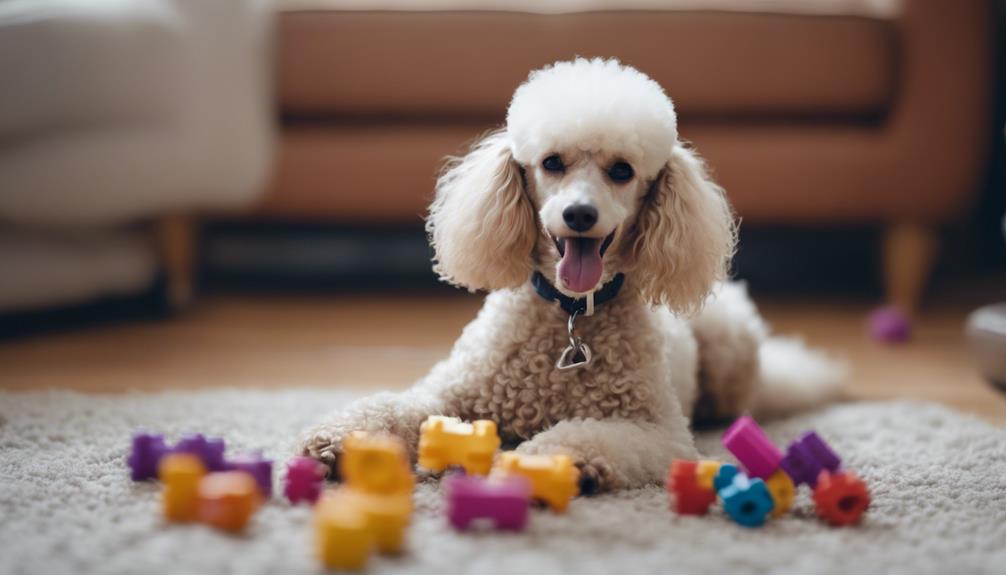When it comes to training your Poodle, unlocking their potential through mental stimulation is key. Imagine a world where your furry companion eagerly looks to you for the next exciting challenge, their intelligence shining through as you guide them on this journey of growth and learning. But what does mental stimulation entail, and how can it transform your training sessions with your Poodle? Let's explore how engaging their minds can lead to a deeper connection and more successful training outcomes.
Key Takeaways
- Mental stimulation is crucial for engaging poodles and preventing boredom-related issues.
- Interactive toys and training sessions enhance cognitive abilities and promote positive behaviors.
- Incorporating mental stimulation boosts focus, learning effectiveness, and problem-solving skills.
- Overall, mental stimulation in poodle training leads to improved behavior, confidence, and well-being.
Importance of Mental Stimulation in Poodle Training
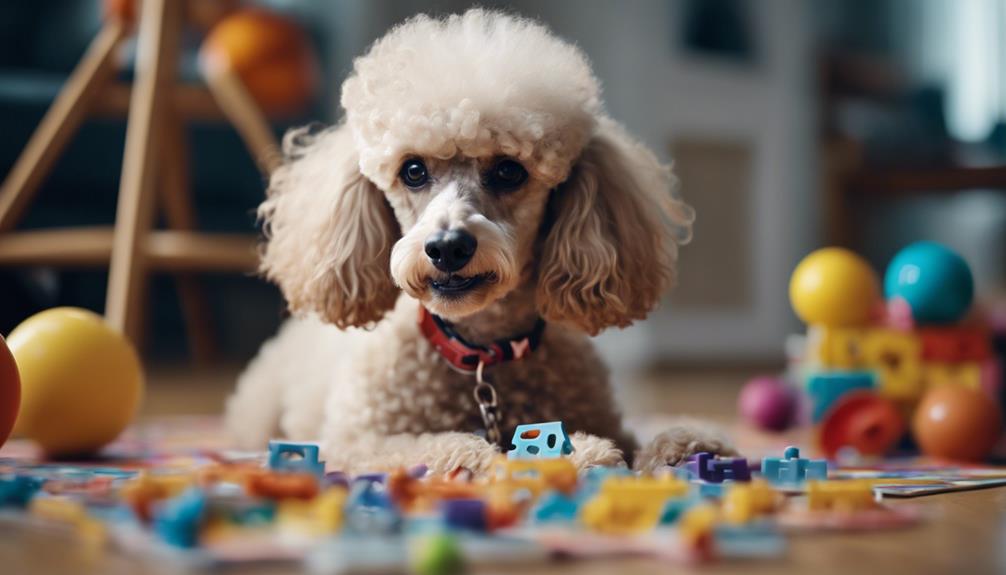
In successful poodle training, the importance of providing adequate mental stimulation cannot be overstated. Mental stimulation plays a crucial role in keeping your poodle engaged and fulfilled, preventing boredom-related behavioral issues. By incorporating activities like puzzle-solving and interactive games into your training sessions, you are not only enhancing your poodle's cognitive function but also boosting their confidence. A mentally stimulated poodle is more likely to exhibit positive behaviors and less prone to destructive tendencies. Furthermore, engaging in mental challenges during training sessions contributes to the overall mental health and well-being of your poodle. When you prioritize mental stimulation in your poodle's training regimen, you are not just teaching commands but also enriching their life experiences. Remember, a stimulated mind is a happy mind, and a happy poodle makes a happy companion.
Understanding Poodle Behavior and Stimulation
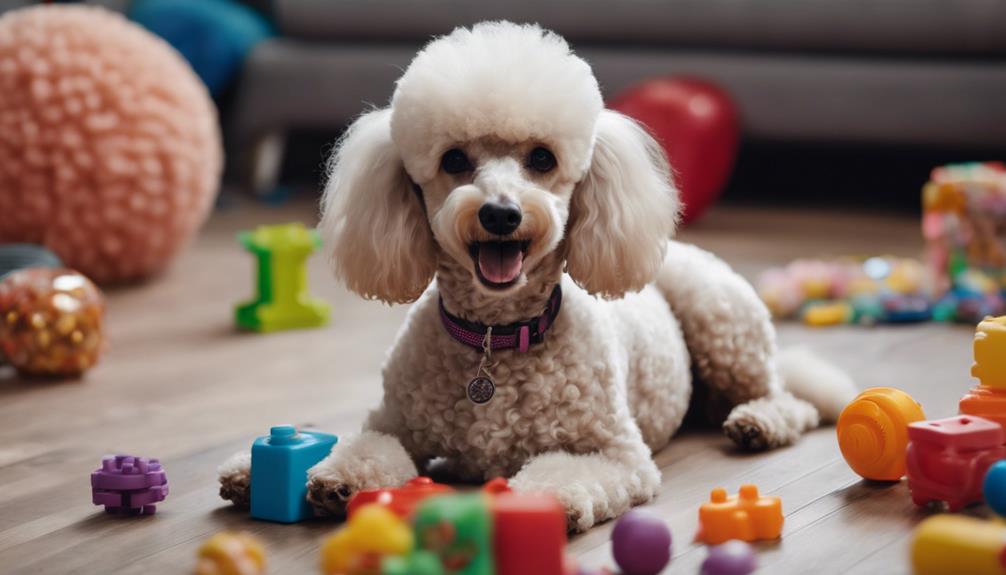
Understanding the behavior of poodles and the role of mental stimulation is essential for effective training and a harmonious relationship with your canine companion. Poodles, being highly intelligent dogs, require mental stimulation to prevent boredom and potential behavioral issues. When deprived of mental challenges, poodles may exhibit destructive behaviors such as excessive barking, chewing, or digging. To address this, engaging in training sessions, interactive games, and providing puzzle toys are vital for offering mental enrichment to your poodle. By incorporating mental stimulation into your poodle's routine, you help them channel their energy in positive ways while simultaneously enhancing their cognitive abilities. This understanding of poodle behavior and their need for mental stimulation forms the foundation for successful training and nurturing a happy, well-adjusted pet. Remember, mental stimulation is not just a luxury but a necessity for the overall well-being of your poodle, ensuring a fulfilling and enriching life for your furry friend.
Incorporating Mental Stimulation in Training Sessions
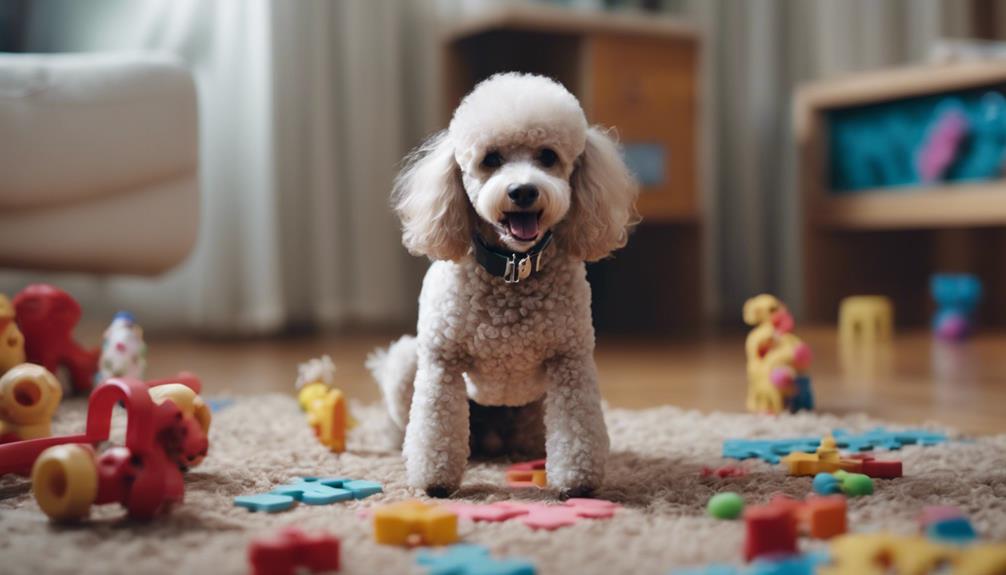
Engaging your poodle in interactive toys during training sessions will boost their focus and participation. Introducing problem-solving exercises can enhance their cognitive skills and promote mental agility. By incorporating these techniques, you can create a dynamic and enriching training environment for your poodle.
Interactive Toys for Engagement
Integrating interactive toys into your poodle's training routine can significantly enhance mental engagement and learning effectiveness. These toys, such as puzzle feeders and treat-dispensing toys, provide mental stimulation by encouraging problem-solving and critical thinking skills. They make training sessions fun, engaging, and effective for poodles. By using toys that dispense treats as rewards, you can reinforce positive behaviors in your furry friend. Additionally, interactive toys help maintain your poodle's focus and attention, ultimately enhancing the overall training experience. To highlight the benefits of interactive toys further, consider the table below:
| Benefits of Interactive Toys |
|---|
| Engages the mind |
| Encourages problem-solving |
| Reinforces positive behaviors |
| Enhances focus and attention |
Problem-Solving Exercises Benefits
Incorporating problem-solving exercises into your poodle's training regimen offers a valuable opportunity to enhance cognitive abilities and mental acuity. These exercises not only boost cognitive skills but also improve mental agility, helping your poodle stay sharp and focused during training sessions. By engaging your poodle in problem-solving tasks, you are actively strengthening their ability to think critically and solve complex challenges. Furthermore, these mental stimulation exercises play a crucial role in preventing boredom and encouraging active learning, leading to a more fulfilling training experience for your furry companion. Providing your poodle with challenging tasks during training sessions is key to promoting overall mental well-being and ensuring they are mentally stimulated and engaged.
Benefits of Mental Exercise for Poodle Behavior
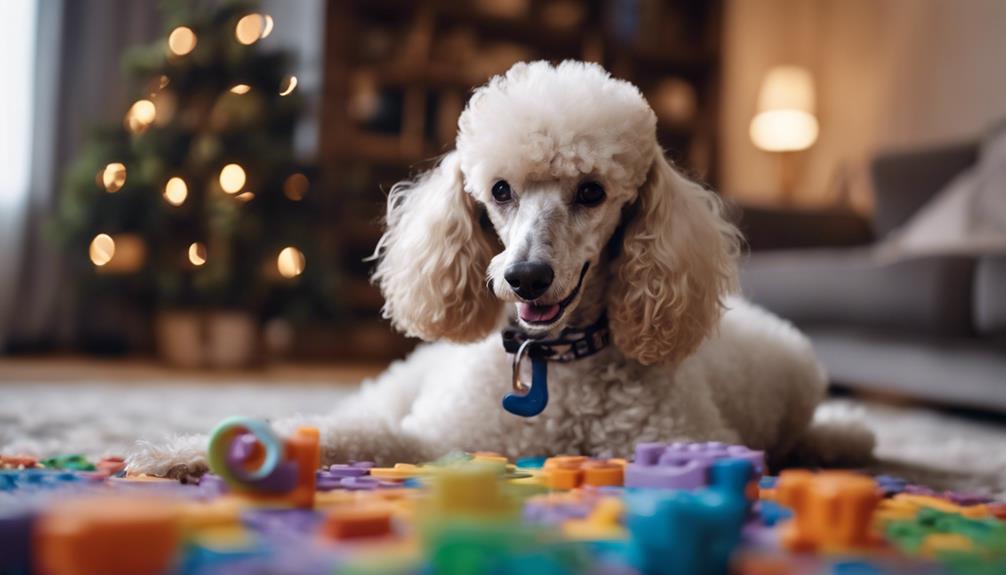
Engaging your Poodle in mental exercises not only prevents behavioral issues but also enhances their cognitive abilities. By providing cognitive enrichment, you can expect improved focus and obedience from your furry companion. Regular mental challenges are key to fostering good behavior and a healthy mindset in your Poodle.
Cognitive Enrichment for Poodles
Cultivating cognitive enrichment for your poodle can significantly enhance their behavior and overall well-being. Engaging your dog in mentally stimulating activities, such as interactive toys and problem-solving tasks, can have numerous benefits. These activities not only keep your poodle entertained but also help in developing their cognitive abilities and problem-solving skills. To illustrate the importance of cognitive enrichment, consider the following table:
| Benefits of Cognitive Enrichment for Poodles |
|---|
| Enhances problem-solving skills |
| Reduces boredom-related issues |
| Promotes positive behavior |
| Supports overall well-being |
Improved Focus and Obedience
To enhance your poodle's focus and obedience, mental exercise plays a crucial role in improving their behavior during training sessions. Engaging in mental exercises helps reduce distractions, leading to better obedience and quicker learning. By providing cognitive challenges, you can promote your poodle's mental sharpness and overall cognitive development, making them more attentive and trainable. Incorporating mental stimulation activities in obedience training can prevent boredom-related behavioral issues and create a positive training experience for both you and your pet. Moreover, increased mental exercise not only strengthens the bond between you and your poodle but also fosters a more cooperative and responsive relationship. Keep challenging your poodle's mind to see improvements in focus and obedience during training sessions.
Mental Stimulation Techniques for Poodles

To effectively engage a poodle's cognitive abilities, incorporating mental stimulation techniques is crucial in their training regimen. Here are some practical ways to provide mental enrichment for your poodle:
- Interactive Toys: Utilize toys that require problem-solving skills, such as treat-dispensing balls or puzzles, to keep your poodle mentally active and engaged.
- Puzzle Feeders: Feed your poodle using puzzle feeders to make mealtime more stimulating. This not only provides mental exercise but also slows down eating, promoting better digestion.
- Obedience Training: Combine obedience training with fun tricks like spin, roll over, and shake hands to stimulate your poodle's cognitive function while reinforcing good behavior.
- Scent Games: Engage your poodle in scent games like hiding treats around the house or yard. This taps into their natural hunting instincts, providing mental challenges and enrichment.
Role of Enrichment Activities in Poodle Training
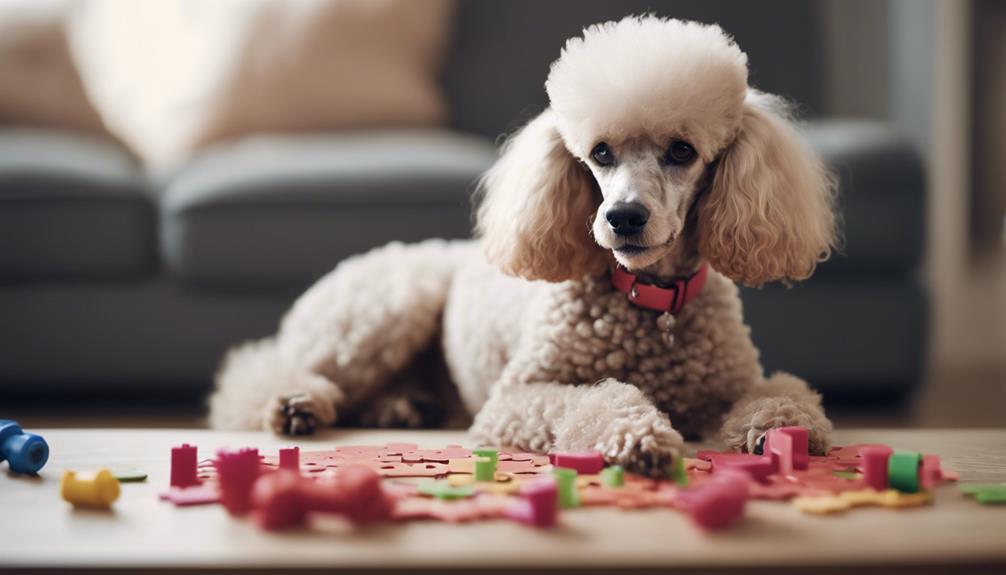
Engaging poodles in enrichment activities during training sessions enhances their cognitive abilities and fosters mental agility. These activities, such as interactive games and puzzle-solving, play a crucial role in providing mental stimulation, preventing boredom, and promoting overall well-being in poodles. Incorporating toys that encourage problem-solving can help keep your poodle engaged and mentally active. By introducing these enrichment activities into your poodle's training routine, you not only enhance their cognitive function but also help build their confidence and reduce stress levels. Additionally, these activities create a strong bond between you and your poodle, making training sessions more enjoyable for both of you. Ensuring that your poodle is mentally stimulated through games and toys can significantly contribute to a well-rounded training program, leading to a happy and well-adjusted furry companion.
| Benefits of Enrichment Activities |
|---|
| Enhances cognitive abilities |
| Fosters mental agility |
| Prevents boredom-related issues |
| Builds confidence |
| Strengthens bond with the owner |
Challenges Addressed by Mental Stimulation in Poodles
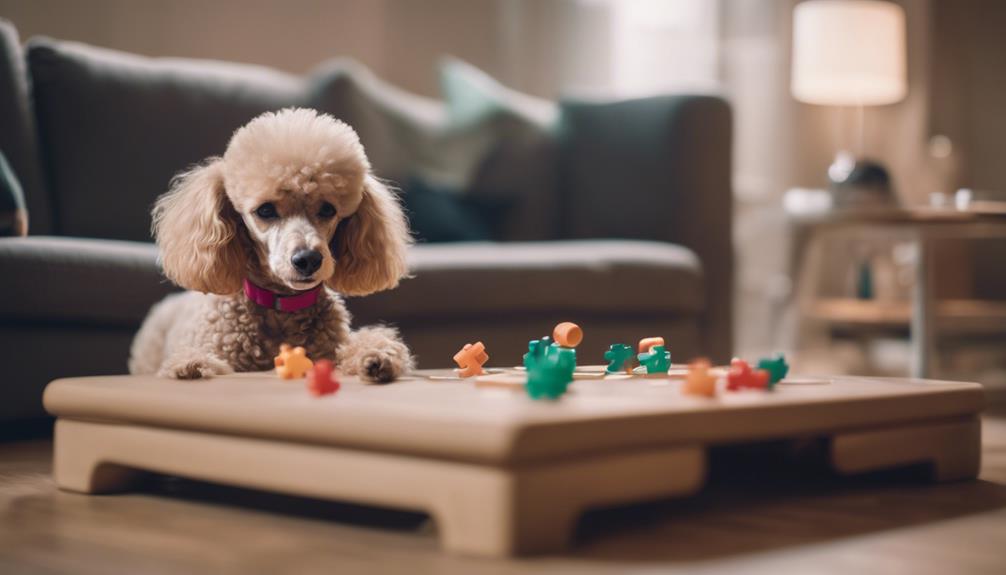
Addressing challenges through mental stimulation in poodles involves presenting them with mental challenges during training sessions. By providing such stimulation, you can emphasize the importance of engaging their minds to foster better learning outcomes. This approach promotes active participation and mental agility, contributing to a more enriching training experience for both you and your poodle.
Mental Challenges in Training
Incorporating mental challenges into poodle training sessions enhances their focus and combats boredom effectively. When facing mental challenges in training, consider the following:
- Interactive Brain Games: Engage your poodle in brain games to stimulate their cognitive abilities and keep them mentally sharp.
- Specialized Training Classes: Enroll your poodle in training classes that offer mental stimulation tailored to their intelligence level and learning style.
- Varied Stimulation Activities: Rotate different types of mental stimulation activities to prevent monotony and maintain high interest levels in training.
- Bonding Opportunities: Utilize mental challenges as bonding opportunities to strengthen the emotional connection between you and your poodle while improving their focus and obedience.
Importance of Stimulation
Mental stimulation plays a crucial role in poodle training by combating boredom and promoting overall well-being. Poodles, as working dog breeds, need activities that challenge them mentally to keep them engaged and prevent behavioral issues. Providing mental stimulation helps address the need for cognitive challenges, which can prevent destructive behaviors like chewing or excessive barking. Dogs need this stimulation to stay mentally sharp and avoid anxiety and stress. By incorporating mentally stimulating activities into training sessions, poodle owners can help strengthen the bond with their pets and foster a positive relationship. This engagement not only enhances problem-solving skills and cognitive function but also maintains focus, attention, and eagerness to learn, resulting in successful obedience and skill development.
Engagement for Better Learning
To optimize poodle training outcomes, engaging your pet in mentally stimulating activities is key to fostering a dynamic and enriching learning environment. Here are four ways engagement enhances learning:
- Interactive Training Techniques: Incorporate games like hide and seek or puzzle toys to keep your poodle mentally engaged and eager to participate.
- Varied Activities: Rotate between different types of mental stimulation activities to prevent boredom and maintain your poodle's interest.
- Consistent Challenges: Gradually increase the difficulty of tasks to challenge your poodle's cognitive abilities and promote continuous learning.
- Positive Reinforcement: Reward your poodle with treats or praise when they successfully engage in mental stimulation activities to reinforce positive behavior and encourage participation.
Mental Engagement for Poodle Cognitive Development
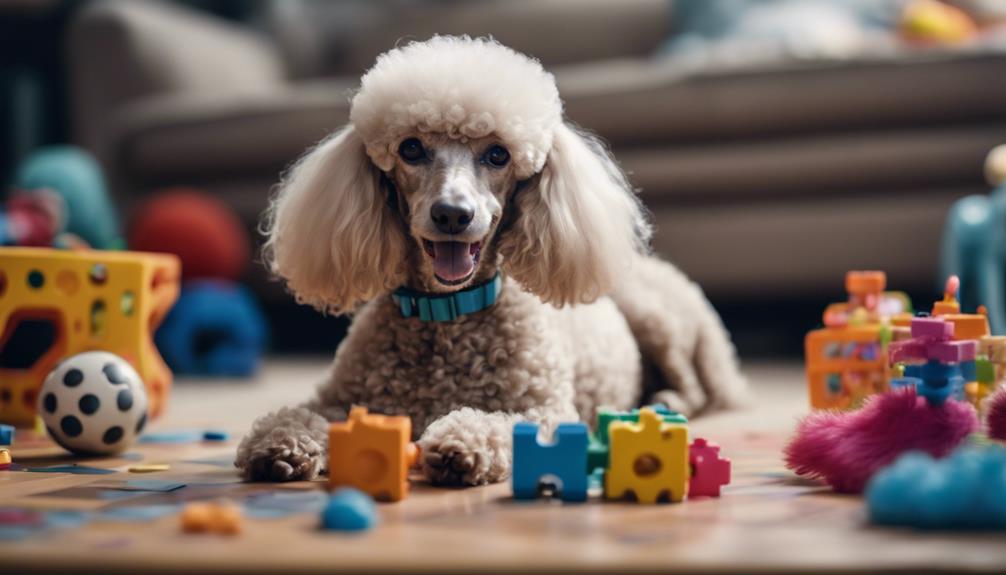
Engage your poodle's mind through interactive training sessions to boost intelligence and enhance cognitive abilities. Mental stimulation plays a vital role in your poodle's cognitive development, improving problem-solving skills and overall brain function. By providing puzzle toys, games, and incorporating scent activities during walks, you can keep your poodle mentally sharp and prevent boredom-related behavioral issues. Regular mental stimulation activities contribute to a well-rounded training regimen, promoting a balanced and agile mind in your furry companion.
| Mental Stimulation Benefits for Poodles | ||||
|---|---|---|---|---|
| Enhances problem-solving skills | Stimulates cognitive development | Boosts intelligence | Prevents boredom-related issues | Promotes balanced mental agility |
Implementing Brain Games for Poodle Training
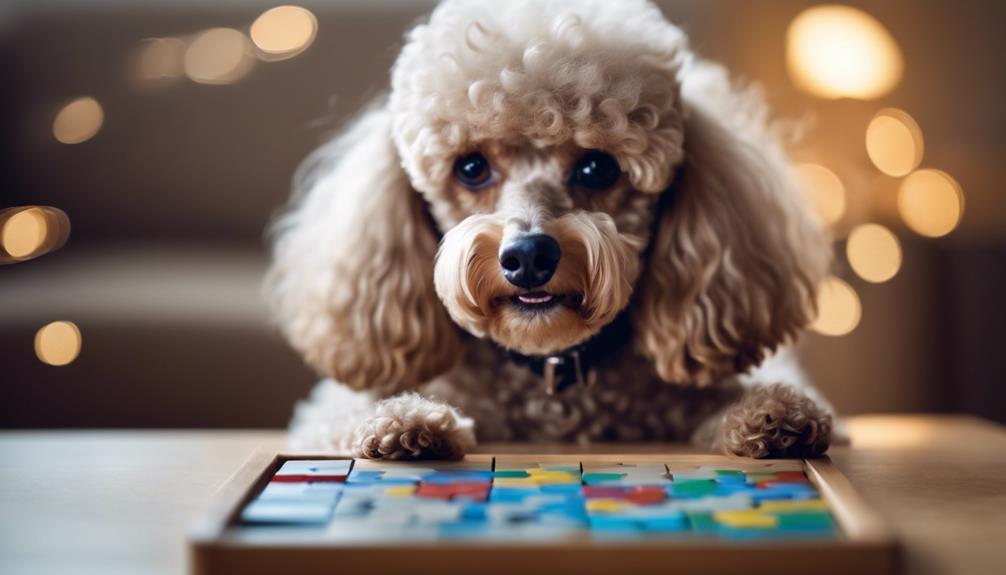
To enhance your poodle's training experience and mental development, incorporating brain games can significantly elevate their focus and cognition during training sessions. Here are some practical ways to implement brain games for your poodle:
- Mentally Stimulating Treat Dispensing Toys: Use interactive toys that dispense treats as rewards for solving puzzles or completing tasks. This engages your poodle's mind while rewarding them for their efforts.
- Hide and Seek with Treats: Hide treats around the house or in a specific area for your poodle to find. This game not only provides mental stimulation but also taps into their natural hunting instincts.
- Trick Training Sessions: Teach your poodle new tricks regularly to keep their mind active and engaged. This not only helps in mental development but also strengthens the bond between you and your furry friend.
- Rotate Training Techniques: Keep your poodle interested and motivated by regularly switching up the brain games and training activities. This prevents boredom and ensures continuous mental enrichment during training sessions.
Enhancing Poodle Training With Mental Challenges
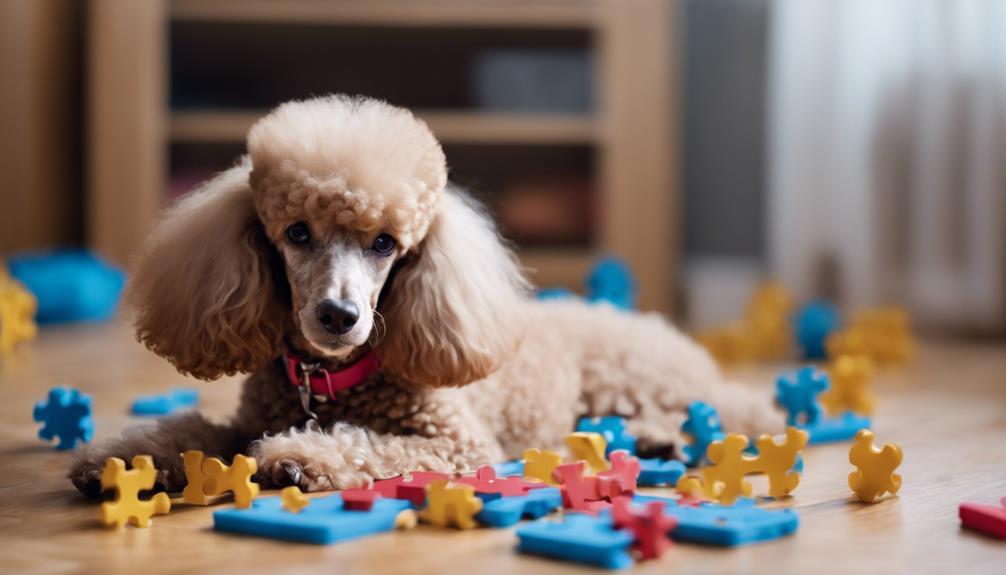
Enhancing your poodle's training regimen with mental challenges is key to fostering their cognitive growth and overall development. By incorporating interactive activities that require problem-solving skills, you can provide the mental stimulation necessary for your poodle to thrive. These challenges not only enhance their cognitive abilities but also keep them engaged and focused during training sessions.
Engaging your poodle in tasks that require thinking, such as puzzle toys or obedience exercises, can greatly benefit their mental acuity. This mental exercise complements physical exercise, ensuring a well-rounded training program that targets both their mind and body. Interactive activities not only improve their problem-solving skills but also help them retain training lessons better.
Long-Term Effects of Mental Stimulation on Poodles
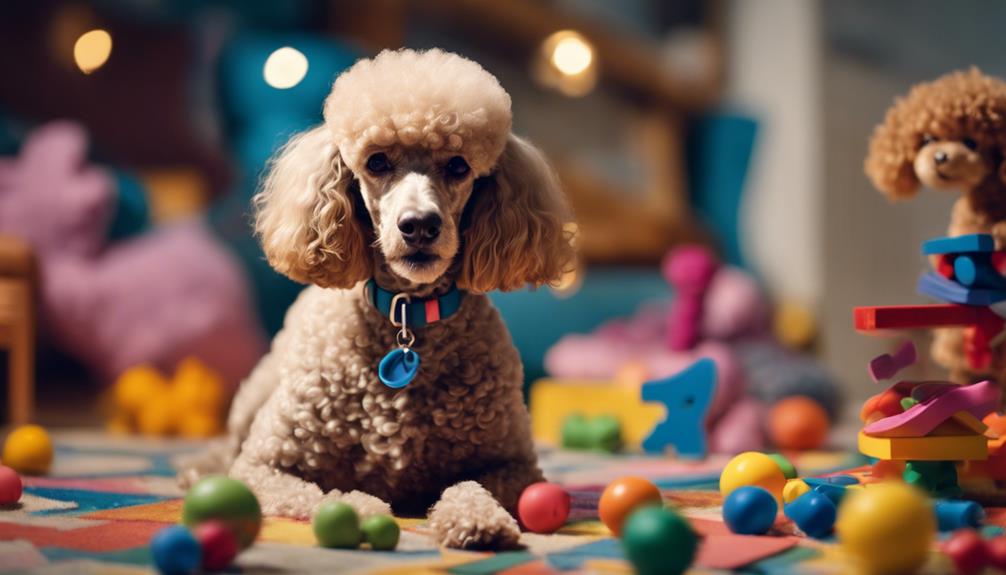
Regular mental stimulation in poodles fosters cognitive function and problem-solving abilities, contributing to their long-term mental health and well-being. Engaging your poodle in various mental activities has significant benefits that extend beyond just keeping them entertained. Here's why long-term mental stimulation is crucial for your poodle:
- Preventing Boredom: Mental stimulation helps prevent boredom-related behavioral issues in poodles, such as excessive barking or destructive tendencies.
- Enhancing Cognitive Function: By challenging their minds regularly, poodles can maintain and even improve their cognitive abilities as they age.
- Boosting Overall Mental Health: Long-term mental stimulation contributes to enhancing your poodle's overall mental health and well-being, leading to a happier and more fulfilled companion.
- Strengthening the Owner-Poodle Bond: Engaging in mental activities like training and interactive games not only benefits the poodle but also strengthens the bond between dog owners and their furry friends.
Consistent mental stimulation is a key aspect of responsible poodle ownership, ensuring that your canine companion leads a fulfilling and mentally stimulating life.
Frequently Asked Questions
Do Poodles Need Mental Stimulation?
You need mental stimulation. Poodles thrive on cognitive challenges, enriching activities, problem-solving tasks. Keep them engaged. Mental stimulation is vital for their well-being. It builds confidence, sharpens their minds, and prevents behavioral issues.
How Does Mental Stimulation Help Dogs?
Engaging your dog's mind with mental stimulation brings cognitive benefits and enrichment. It boosts problem-solving skills, enhances engagement, and nurtures their learning potential. Through mental exercises, you create bonding opportunities that aid in their overall development.
Does Mental Stimulation Tire Dogs Out?
Engaging in brain games and cognitive challenges can tire your poodle out mentally, leading to reduced energy levels and promoting relaxation. Mental fatigue from such activities can pave the way for a peaceful nap time.
What Is the Best Mental Stimulation for Dogs?
To keep your poodle mentally sharp and engaged, try incorporating puzzle toys, interactive games, training exercises, and enrichment activities into their routine. These activities provide mental challenges, prevent boredom, and strengthen your bond.
Conclusion
In conclusion, mental stimulation is a key component of successful Poodle training. By incorporating engaging activities that challenge their minds, you can enhance their behavior and strengthen your bond. While some may argue that mental stimulation is time-consuming, the benefits far outweigh the effort. Remember, a mentally stimulated Poodle is a happy and well-behaved companion. So, make sure to prioritize mental exercises in your training routine for a smarter and happier pup!
